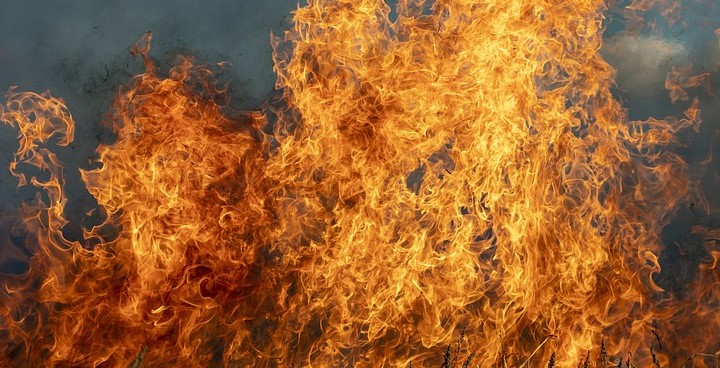Wildfires are accelerating carbon loss from ecosystems, reducing the planet’s ability to store carbon and complicating efforts to meet global climate targets. According to new research led by the UK Met Office and UKCEH scientists alongside Brazil-based collaborators, fire is already affecting land carbon sinks, especially forest ecosystems, making it harder to slow global warming, even before we reach 1.5°C of warming.
“At 1.3°C of warming, we're already seeing fire-related impacts on carbon storage in ecosystems," said lead author Dr Chantelle Burton. “This makes the 1.5°C target of the Paris Agreement even more critical to prevent escalating impacts.” The study highlights how fire is not just a future challenge but a current issue, as fires are already reducing the capacity of forests and other ecosystems to sequester carbon. “Fires are reducing the ability of forests and other ecosystems to store carbon, narrowing our window to keep global warming in check,” Dr Burton added.
Co-author Dr Douglas Kelley, a land surface modeller from the UK Centre for Ecology & Hydrology highlighted the immediate concern. “Our findings underscore a stark reality: fires are not just an issue for the future; they're affecting our planet now. As temperatures rise, fires are increasingly pushing natural carbon sinks towards sources of carbon emissions.”
The research used advanced global land and climate models to explore how fires affect ecosystems' ability to store carbon. By examining both historical data and future scenarios, the team identified critical temperature thresholds where fires cause significant shifts in tree cover and carbon storage. Alarmingly, the latest temperature at which, globally, these impacts become pronounced is 1.34°C—close to current levels of warming.
Every 0.1°C matters
Limiting global warming to 1.5°C is widely seen as an effective guardrail for avoiding the worst impacts of climate change and defining action on mitigation. However, this research shows that fire impacts vary considerably, emerging at different times depending on the region. Some areas, like the Northern Boreal forests and tropical South America, are already showing signs of stress earlier than expected, including reductions in tree cover and ecosystem degradation as well as carbon loss. In contrast, other regions may not experience the worst impacts until closer to 2°C of warming.
This regional variation underscores why every 0.1°C matters. Small differences in global temperature could mean the difference between ecosystems continuing to store carbon or releasing it. Such changes could also mean the difference between preserving vast areas of forest or witnessing large-scale deforestation and shifts to less carbon-rich vegetation. These findings emphasise the need for both global and region-specific strategies to mitigate fire impacts.
Rethinking mitigation and adaption
One of the paper’s key contributions is its call for a rethink of the relationship between mitigation and adaptation. Traditionally, these two approaches have been seen as separate: mitigation reduces emissions, and adaptation helps us cope with the impacts that are already happening. But fire shows how closely linked they are. Reducing emissions, including those from wildfires, can lower future fire risks, while adapting fire management strategies is crucial for helping ecosystems remain resilient amid changing fire regimes and preserve forest cover.
The findings of this study point towards a broader shift in climate policy: prioritizing impact avoidance alongside temperature targets. While temperature limits like 1.5°C are important, it’s equally critical to focus on minimizing the specific impacts we’re already starting to see -such as fires reducing carbon storage capacity.
The research suggests that human actions can still influence future fire regimes, and the more we do now to limit warming, the better our chances of protecting vulnerable ecosystems. This approach could help steer the conversation away from just temperature thresholds and towards a more comprehensive view of how we can avoid the most severe impacts of climate change.
Brazil as a lens for understanding global patterns
Although this study takes a global view, the fires currently burning in Brazil offer a timely example of fire’s effects on carbon sinks. The Amazon rainforest, one of the planet’s largest carbon stores, Pantanal and the Cerrado biomes are experiencing fires that not only threaten biodiversity but also its ability to maintain carbon-rich forest cover. This is a reminder of the complex ways in which fire interacts with climate and ecosystems.
In addition, Brazil's fires highlight the value of international scientific collaboration. Partnerships between Brazilian and UK researchers, including those involved in this study, are leading to new insights about how fire regimes are changing and how best to manage these risks. As a global issue, fire requires coordinated efforts, and the Brazil-UK collaboration serves as a model for how countries can work together to tackle shared challenges.
Further information
Full paper: Burton et al. 2024. Fire weakens land carbon sinks before 1.5℃. Nature Geoscience. Open access.
Behind the paper blog post: Fire is already weakening the world's carbon sinks
